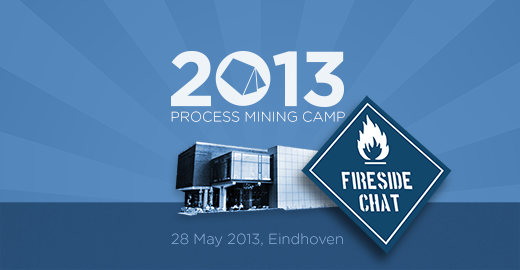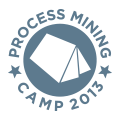In less than two weeks, we will have our Process Mining Camp here in Eindhoven. If you haven’t signed up yet, make sure you do before the end of this week to also get your official camp t-shirt!
Like last year, the heart and soul of Process Mining Camp will be our practice talks – candid presentations from experienced process miners in which they share their ideas, stories, and their tricks. To give you a sneak preview, we are having fireside chats with our practice talk speakers here on our blog. Today, we bring you the interview with Walter Vanherle, who will also guide one of our workshops. Enjoy!
Interview with Walter
Today, you can read the interview with Walter Vanherle, managing partner at bpi3 in Belgium. Walter is a passionate business management professional with almost 30 years of consulting experience. He has solved lots of customer problems and is quick to pin down the business value of process mining in gaining insight into the true processes.
Anne: Can you still remember where and when you first heard about process mining? What exactly caught your attention and fascinated you about the topic?
Walter: I remember that very well. Prof. dr. Koen Vanhoof, who is also a member of the advisory board of the Business Intelligence Community in Belgium, invited me to a lecture in May 2012. The Subject was Big Data and Process Mining. It was organized to honor prof. dr. Wil van der Aalst, on whom the degree of doctor honoris causa was conferred by Hasselt University, Faculty of Business Economics. That lecture sparked my business interest. I then spent the summer by laying my eyes and hands on anything on the subject, including experimenting with ProM. Being a fellow from the University of Leuven, I also got in touch with professors and PhD students on the subject. Starting a business service using data and process mining was a fact. A little later we got in touch.
Anne: Yes, I remember you really dived into the topic and picked everything up very quickly. Where do you see process mining helping the most? What is the key benefit in your view?
Walter: My take to that question would be Where and Who would We help the most. Where would process mining help the most are the business functions dealing with operations. In particular, there are the operational questions: What is going wrong or what can go wrong. Business signals leading to the ‘what is going wrong’ question are, for example, complaints or dissatisfaction signals from suppliers, clients or employees, or unexpected turns of KPIs such as churn, customer loyalty, and more.
The second question, the Who, is easy in theory but difficult in practice. In theory, business function owners are, or should be, the most interested. In practice, since the outcome is not predefined and data is sometimes difficult to get, projects are difficult to plan and budget. In business, if the outcome is not crystal clear, the business owner needs to have a big problem and/or the business owner needs to have guts and/or money. You also have believers. Believers at both sides.
That’s where We come in. Think about the movie of Jerry Maguire: “Show me the money!”. Process mining is a technique most of the business owners are unfamiliar with. Hence they are first somewhat sceptical, even sometimes flabbergasted, when seeing the business cases you bring. We need to help them with the determination of the possible returns, which is the key question. This is our job, the We job.
As for the key benefit, for myself the answer to that question is within a picture I learned in one of the process mining seminars organised by SAI in Belgium. The picture provides a view on a Business Process Lifecycle starting from the identification of the process. Until recently, it was hard to discover the real process flow, analyze or measure performance and conformance. That’s the key benefit of process mining: A measurable execution of process flows, including monitoring the effect after (re-)design and implementation.
Let’s also be straight that commercial, the real commercial, application of the discipline is becoming known but it is not yet common knowledge. It is gaining interest, that is for sure. Business experts with both experience on the application of process mining technology and the ability of linking this to business impact are in creation.
Business is getting a new instrument in their hands that has the promise to be able the loosen the controls in all kinds of compliance and regulated executions that are, potentially, and in some cases it is the reality, killing speed and flexibility in process execution. Business is getting an instrument in hand to better measure a real, running operation, to be able to do business more flexibly, streamlined, or in a more simple way.
Anne: At camp, you will talk about two concrete case studies, where you used process mining to measure SLA-based KPIs. You will also be helping out in one of our new expedition workshops, where a discussion group will take on the topic of business value and ROI. What can people expect from that workshop?
Walter: Business cases and business scenarios, including impact classification and impact quantification, are important to show the business what they can expect from the efforts of doing a process mining analysis. If process discovery and data exploration are to become a new norm, I expect business responsibles wanting to measure and determine the cost/benefit ratios. They want to have effort/return indications knowing which of the possible improvement initiatives to start first, or to start at all, following the process mining effort.
In line with the expedition theme, the workshop will be of an explorative nature. I have my views on how process mining-based improvement suggestions can be quantified and am curious how others approach topics such as business case, business scenario, cost/benefit, effort/return, impact classification, and impact quantification. Ill also share our value impact template (VIT) format, which we use in our own projects to estimate the value impact of specific improvement initiatives, to kickstart the discussion.
Anne: Thanks, Walter! It will be great to see you at camp!
Would you like to hear more from Walter about his experiences? Are you interested in sharing first-hand knowledge with fellow process miners? Register now to reserve your seat at Process Mining Camp on 28 May in Eindhoven. We only have a strictly limited number of tickets, and they are going fast…


